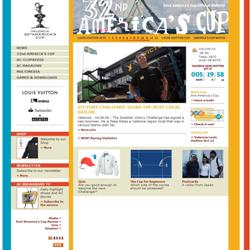|
|
||||||||||||
During one of the Louis Vuitton Cup Acts, CupInfo's European Editor talked with Marcus Hutchinson, Head of Media for America's Cup Management. Here are excerpts from their wide ranging conversation about the plans in place for AC32, the history and future of the Cup: CupInfo: Marcus, Could this program be replicated next time? Marcus Hutchinson: For the 33rd Americaís Cup? Well, thatís a very loaded question. The fundamental of the Cup is if you win it you make the rules for the next one ... thatís a very loose way of putting it. You have to find common accord with the Challenger of Record and things like that, but the bottom line is you get to stamp your vision of things -- not your authority, but your vision of how it should be. We have all been waiting for the Cup to come to Europe for a long time. We know what we would like and we know the constraints of the European situation, why itís different from New Zealand or San Diego, so that's the reason we have been doing this, to build it up and make some presence, because otherwise it would just be missed. But if Alinghi were to win again, yes, Iím sure theyíll make a lot of modifications. But, I think it would just be the next stage. Maybe the boats would be changed, maybe weíd do more Acts, maybe the bases would be restricted, maybe the match would be in two years time not four years time, many things like that. But if New Zealand won the next Americaís Cup, they could do anything. They could make it a 100% born-in-the-country nationals only onboard each team - in which case half of these teams would really have to scratch their heads and train up their own nationals to sail onboard. They could sail it in Dubai if they chose to, they could sail it in two years or four years - they can do anything they want. Iím just using this as an example. If the German team wins maybe they would say "Wow, those guys organized the last Cup and they really know what theyíre doing. Letís just buy that company and make them do it for us." Off we go and take 10% of everything they earn. Just let the management company organize the event. There is a trust for the Cup, so when you win the Cup you become the current trustee and you have no right to impose upon the future of the Cup, but you can steer the direction by making your tenure with it a good example of how you think it should be. If Larry Ellison won it and took it to San Francisco, then he would put a little more of an American stamp on it and maybe some of the values that we have here, that we like in Europe, would be lost, and maybe some of the values they like in America would be added. We already have quite a lot of value that New Zealanders thought was important. The Cup has moved four times since 1983 and not at all before that - it was moved from New York to Newport, but that was in prehistoric times relative to the Cup. Every time itís moved thereís been an evolution, not a revolution, not dramatic change or Ďthrow out the old bring in the new.í Itís always kept whatís been good and whatís been intelligent before but added something. For Europe, or for any time itís moved there are two things thatís influenced the way itís evolved: One is the venue - when I say the venue, itís about Europe, ... about the city ... where the wind blows from that direction at this time of day. Itís about a big market behind it, itís about a international airport nearby, itís about plenty of accommodations, x,y and zed. Itís about a time zone that people need deadlines for their media operations at five oíclock, not seven oíclock or three in the morning or whatever it happens to be. So thatís the first issue/element. The second element is the era that we are living in. We are right now in the 21st century and you can watch it on your mobile phone if you want. When I started doing this event, which isnít that long ago, we used a fax machine to send press releases. In my media center we had two people doing the news. Well, I have a staff of 40 people now! You have to argue, are we making more noise or less noise or are we just exhausting ourselves by the end with the website, etc. Iím sure in 10 years time, or in 50 years time, if the Americaís Cup still exists, and Iím sure in some guise it probably will, as long as the world still exists, it will reflect the way the world is at that time. And, thatís one of the amazing things about the Cup.
There are so few institutions in the world that have existed in a similar concept since the mid of the 19th century. So you can see a little snapshot of how the world was at any time through the Cup. You want to see how it was in 1930, see who the players were, who the top industrialists were, see how the media organized themselves, see how technology was in boat design ... after all, if you want to see how it was 1877 or 1958, you can do that through the Cup. Even from the 1970s, 80s, 90s, you look at the pictures now, and there are so few events you can do that with. The Olympic games Ö the documentation of it is hard to understand before the middle of the last century. The same with the Soccer World Cup Ė it really wasnít a big deal until, what, the 1950s? |
|

